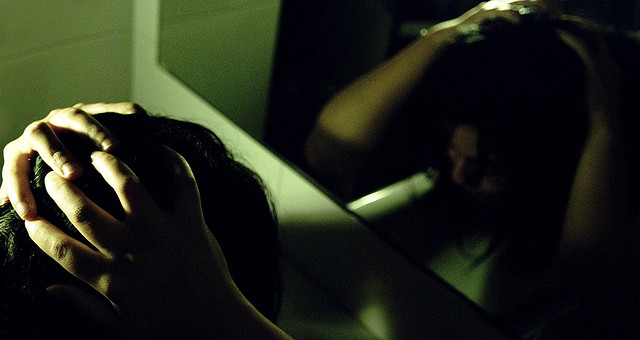Fear of the Fear: Why Your Mind Gets Scared of Anxiety

Flickr image by fedewild
In this week’s podcast, we’re talking about how to protect yourself from being swept away by the awful thoughts and symptoms that anxiety can suddenly manifest.
Anyone who suffers from anxiety knows that one of it’s most disturbing features is its definite physical presence - the way it makes you feel.
You might be feeling fine one minute and then feel completely overwhelmed by a suddenly pounding heart or racing pulse the next.
How Anxiety Symptoms Cause Fear of the Fear
Some anxiety sufferers become dizzy and feel like they might faint, some have trouble catching their breath, or fear they might choke, and some fear they might lose control entirely or even die.
Anxiety causes such chaos in the body that your mind develops a strong reaction to the event and will do all it can to protect you from it happening again. Unfortunately, the way the mind often does this is by creating fear of the fear.
Fear is useful if it manifests as a sense f caution when we’re near the edge of a cliff, but it becomes a big problem when it develops in response to an internal event - which is precisely what an anxiety attack is.
Your mind tries to protect you - but it gets it WRONG
Once you’ve had one anxiety attack, your mind will prompt you to avoid any place or situation where you’ve experienced anxiety before. Avoidance is your mind’s way of trying to protect you.
Once you have experience intense pain or anxiety somewhere, your mind will generate an aversion to going there again.
Subconsciously, there's a dialogue running saying: “last time you went there this happened, you got scared and hurt: don’t go there again.”
It’s the nature of the mind to start avoiding any place or situation that has caused you suffering in the past. It works in a similar way to a phobia - if something scares you intensely once, your mind will make you wary of that thing in the future in an attempt to keep you safe from harm.
Again: the problem here is that anxiety is an inside job, it isn’t caused by being in a specific place or situation, it is caused by us experiencing intense fear and unwanted symptoms internally and randomly - and that’s what causes a big problem for the mind.
The problem with anxiety and phobias is their all-pervasive nature - the mind becomes so concerned that you’re going to have that horrible experience again that it starts making anxious predictions and starts looking for potential problems everywhere.
Now the dreaded what if thoughts kick in
In a desperate and confused attempt to protect you, your mind starts sending you warning thoughts like:
What if I have an anxiety attack here?
What if I pass out during my presentation?
What if it happens when I’m driving?
In the same way that a person who’s terrified of spiders might start fearing and avoiding all the possible places a spider could be lurking.
Instead of the anxiety incident being a contained it leeches into the rest of your life with a constant fear of it happening again.
Points covered in this podcast:
How changing your thoughts about anxiety can help you cope
Anxiety can’t hurt you
How to catch anxiety attacks early and take action to stop them building
The power of diffusing stress daily
Developing positive self-talk

{New Course} Anxiety Slayer First Responder Series: Anxiety Attacks
Over the last nine years, we've uncovered the biggest challenges people face with anxiety attacks.
The three concerns we hear most include the fear of an attack, not knowing the cause of an attack, and managing anxiety.
In the
Anxiety Slayer First Responder Series
, we respond to these three challenges with step-by-step teachings, tools, and techniques to help you overcome anxiety attacks and reclaim your life.
